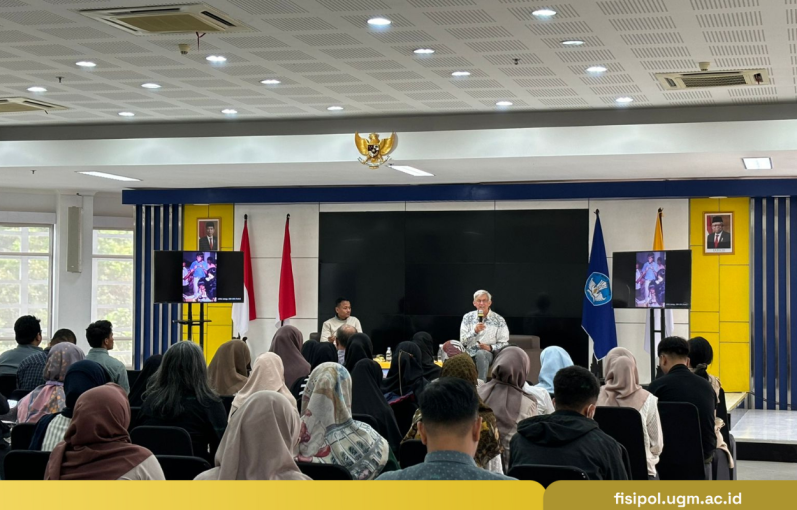
Yogyakarta, July 18th, 2024─In an effort to strengthen the discourse about social science as the locomotors of social transformation, the Department of Social Development and Welfare decided to organize the 4th Graduate Symposium. This Symposium, that was organized on Thursday (18/07) at the Fisipol UGM Auditorium, chose the theme of “Emancipatory Social Sciences in the Reformation Era”. The 4th Graduate Symposium aims to dig deeper on the role that social science needs to take in order to answer the many challenges in the ever more complex reformation era. This event included Prof. Gerry van Klinken, senior researcher at the Royal Netherlands Institute of Southeast Asian and Caribbean Studies (KITLV) as the main speaker.
Gerry interpreted the thoughts of Erik Olin Wright that were retrieved from the book “Envisioning Real Utopias”. “Erik Olin Wright defined emancipatory social science as scientific knowledge that is linked to the collective effort of humanity in opposing societal oppression,” said Gerry.
Gerry then went on to explain that emancipatory social science is very much heavily tied to moral values that are absolute in knowledge production. “In contrast to positivist knowledge that are intended to avoid moral values, emancipatory social science insteads promotes these moral values and objectives,” described Gerry.
Gerry continued to state that there are three characteristics of emancipatory social science. The first is critical diagnosis. In order to do a critical diagnosis, there needs to be further understanding about the value of justice that is clear and democratic. After the critical diagnosis, emancipatory social science is expected to find an alternative that is much fairer for everyone. Lastly, Gerry talked about how those alternatives can be applied and implemented in reality so that they can live better lives.
But, Gerry felt that Erik’s idea of an emancipatory social science is ideal. He added that in this reality, pure idealism cannot be fully implemented. He then cited the book “Social Science and Power in Indonesia,” which he thinks can give a clearer picture of how social science in Indonesia is practiced, especially in the New Order era. “Various social sciences in Indonesia are pressured to follow the benchmark made by the government. These benchmarks usually value economic growth and stability,” explained Gerry.
Not just that, Gerry added that the challenges of social science in Indonesia are not just limited in an authoritarian prison. “Social science is not just pressured by authoritarianism like the one that we have seen in the New Order era, but it also faces market pressure.
Those pressures and tensions came from many levels. The first level are the intellectual levels that are usually dominated by intellectual hegemonies. With that, the thoughts of individuals cannot be truly independent and free. Next is the institutional levels. Due to the interdependence of intellectuals and institutions, it is difficult to criticize the institutions, as research is done with the help of those institutions in the first place. Lastly is the social levels. The people often crave consistency and stability in their social orders.
In closing, Gerry conveyed the importance of emancipatory social science in answering various challenges. “Emancipatory social science wants to restore optimism, in that social transformation that is based on the value of justice can be achieved by radically researching both relations and institutions in order to plant the seeds of democratic equality.
This symposium is a manifestation of the effort to achieve Sustainable Development Goals, especially SDG 4 Quality Education and SDG 16 Peace, Justice and Strong Institutions.
